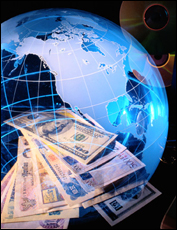March 8, 2008

Image copyright: http://www.york.ac.uk/library/images/illust/economics.jpg
(http://academics.smcvt.edu/economics/Whatis.html)
1. What is this webpage's definition of economics?
Economics is the study of making choices.
2. Complete the following sentence:
__Economics__helps us to examine trade-offs between government policy, company policies, population and so on.
3. TRUE. Nearly all government and individual decisions involve economics.
2. Scarcity of Resources (http://www.tutor2u.net/economics/content/topics/introduction/scarcity.htm)
Scarcity has to do with finite (limited) resources, otherwise known as factors of production.
4. What determines if something is going to have great or no value at all?
The scarcity on a product determines how valuable it is. If a product is scarce the price will rise because of the high demand. But if the product is of great abundance then the price will be low because producers want to sell it.
5. Why can't people have all the goods and services they want or need?
Productive resources are low therefore, people cannot have all the goods and services they and want and need.
6. FALSE. An ever increasing population has no effect on our economic system and natural resources. Circle the correct answer.
7. People must make __CHOICES__ because they cannot have everything they want. Therefore, having __MORE__ of one thing usually means having __LESS__ of something else. Thus economics is about the decisions we make both individually and as a society with our finite factors of production.
3. Finite Resources-Factors of Production (http://www.cr1.dircon.co.uk/TB/1/1.1.4.htm)
8. What three main things make up the factors of production?
The three main things that make up the factors of production are land, labor and capital.
9. What is the thing that some economists consider to be the fourth item of the factors of production??
The things that some economists consider to be the fourth item of the factors of production is entrepreneurship.
10. What is another way to describe entrepreneurship?
Another way of describing entrepreneurship is taking risks to be able to be successful.
11. Define or describe what the three factors of production are:
Land: the land itself, and raw materials such as oil and minerals beneath it.
Labor: human mental or physical effort.
Capital: Man made goods used to produce or make other goods.
12. What four rewards come to people when they choose to use one or more of the factors of production?
The four rewards that come to people when they choose to use one or more of the factors of production are wages(labor), rent(land), interest(capital), and profit(entrepreneurship).
4. Opportunity Costs
(http://www.netmba.com/econ/micro/cost/opportunity/)
13. Explain or define opportunity costs.
-- Opportunity cost it the loss of potential gain from other alternatives when one alternative is chosen.
14. Opportunity cost is used to evaluate the ___COST___ versus the ___BENEFIT___ of different choices.
15. ____Opportunity Cost____ is expressed in relative cost, that is the price of one object relative to the cost of another choice. The different ways in which humans respond to limited resources and issues like scarcity and opportunity cost are determined by the economic system that different societies use, and how they answer three important questions.
5. Three Questions-Economic Systems (http://www.socialstudieshelp.com/Economic_Systems.htm)
The three questions that all societies must answer about what to do with their limited resources are 1) What goods and services are going to be produced. 2) How should these goods and services be produced. 3) Who gets to consume these goods and services? There are four main types of economic systems that societies use to answer these questions.
16. Identify and describe the three main types of economic systems. Record your answers on your study guide.
1. Traditional Economic System: tradition decides what people do for a living and how their work is performed and what they spend on.
2. Command Economic System: the government decides what goods and services are to be produced. And the government sells these goods and services.
3. Market Economic System: economic decisions are the result of individual decisions by buyers and sellers in the marketplace.
17. TRUE No country has an economic system that is 100% communism, socialism, or capitalism. Circle the correct answer.
18. FALSE In a Command Economy, private individuals decide how to use their talents and skills at work.
19. TRUE Free enterprise is another name for capitalism.
20. In the United States, as in most capitalist countries, there are many examples of __government ownership__ ownership of some parts of its economy.
